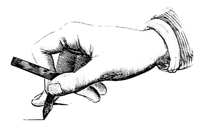Base Ball, upstate New York (1820s)
“How the Game of Ball Was Played”
from “The Game of Base Ball in the Olden Time,” Rochester Evening Express (July 10, 1866), page 3, column 4. Provided by Priscilla Astifan, 2006.
Editors Express: - Perhaps it may interest your young readers to know how the game of Ball was played forty years since, when I was of the age to enjoy it. I really believe that our simple game of Base Ball afforded much more enjoyment, although not asprecise and scientific as the modern game. I will allow that I am not a very competent judge of the modern game as now played, having resided in Rochester over three years and never having seen the game played till the 4th at the fair grounds. Still I made up my mind of the subject, and if not O.K. it is respectfully submitted.
First, about the ball we used: An old pair of woolen stockings were obtained and unraveled and wound tight to the proper size, then it was covered by the shoe or harness maker, or grandmother was teased to cover “my ball. Remember, this was the days before “India rubber,” or “New York” balls. They were not hard a brick; we had no black eyes, sprained fingers, or broken noses; did not stand in fear of being mutilated. The number required to play, depended on the number on hand who wished to play. The one who threw the ball gave the batter some chance to hit it; he did not pitch it with all his strength he could muster, running a few steps to give it a greater velocity but simply stood on his typs in one place and threw the ball.
Then if the batter knocked it or ticked it, and it was caught, even at the first bound, it was out. Any one on the outside could put out their opponents, provided they could hit them between the Bases. The farther the batter could knock the ball the better, as it enabled him to get round without running for “dear life.” As a general rule each one had a fair chance, no umpire was needed, to whose decision you were bound to submit, though you felt sure it was not correct, and if you were not imbued with the spirit of the Great Master, some wicked words would escape your lips. The rules of the game were all simple and easily understood, pleasure and exercise being the object. Tally was kept by cutting notches in a shingle. We had no uniforms, when too hot, off with our coats and boots. We could not go to “Barton’s and get a nice turned club; but depended on those who had a taste for making suitable clubs, some flat, some round.
Comparing the old and new system, the simple and practical, the other still and precise, reminds me of a friend who built a modern hen house. It was finished to the turn of they key, all the nests were numbered. The black hen was to lay in No. 4, speckled in No. 5, the topple crown in No. 15. Now this was a nice contrivance, but old black lay in No 7, speckled in No. 8, and topple crown in No. 8, believing the old way of each hen choosing her own nest, better than any “modern contrivance.”
By the way suppose “Old America” get together and have a game on the old plan, Ball Clubs &c, n one to play that is under 50 years old. It might make us feel young, for the time, reminding us of our playing days, and showing “Young America” what grey heads can do.”
- “W”
